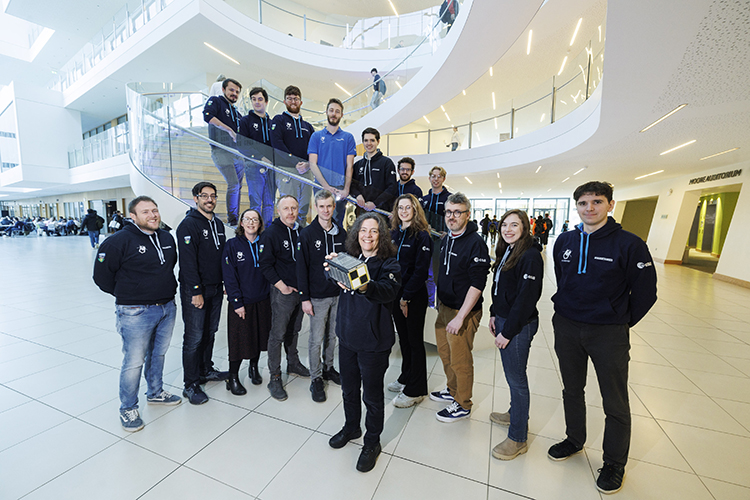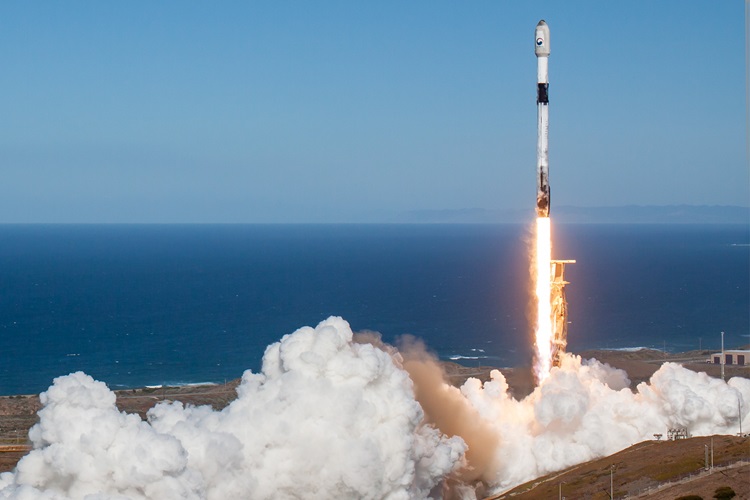Mission Accomplished: EIRSAT-1 to deorbit after two year historic journey
3 September 2025
.png)
Ireland’s first satellite EIRSAT-1 has completed its mission orbiting the Earth and will de-orbit in the coming days.
The launch of the CubeSat, built by students and faculty at University College Dublin under guidance of the European Space Agency (ESA), in 2023 marked a major milestone in Ireland’s space journey.
Its success demonstrated the country’s ability to design, build, and operate a satellite, strengthening national expertise and laying the foundation for future growth in the Irish space sector.
The mission trained more than 50 students, primarily postgraduate researchers in physics, engineering, computer science and mathematics. This included 13 PhD students.
“Although it's a sad day for the team, we're proud that EIRSAT-1 has reached the end of its mission having achieved all of its goals,” said (opens in a new window)Professor Lorraine Hanlon, Director of the EIRSAT-1 project and UCD C-Space, the Centre for Space Research.
“We're keen to apply what we have learned, building new missions, and collaborating to grow Ireland's space sector. I want to acknowledge the achievements of everyone who played a role on the team, and worked incredibly hard to make it such a success.”

Professor Lorraine Hanlon, Director of the EIRSAT-1 project and UCD C-Space, the Centre for Space Research, alongside some of the students and faculty at UCD that worked on the project
“Ireland became a space faring nation with the launch of our first ever satellite, EIRSAT-1, and I congratulate all the staff and students at UCD whose dedication and expertise over many years has driven the success of this mission,” added UCD Vice-President for Research, Innovation and Impact, Professor Kate Robson Brown.
“UCD has deep expertise in space science and engineering and is in prime position to take Ireland forward into a new and ambitious era of growth for the space sector which will deliver both scientific discovery and societal impact.
“Our researchers are working at the frontiers of next-generation in-orbit technologies and they, and our graduates, are already bringing that expertise to industry.”
The result of more than a decade of research at UCD, EIRSAT-1 introduced space systems engineering and skills not previously seen across any Irish industry or academia and helped lead to the country’s largest space investment of €7.9m as part of the UCD-led National Space Subsystems and Payloads Initiative (NSSPI), which is developing next-generation satellite control systems.
Minister of State for Employment, Small Business and Retail Alan Dillon, TD, said the project demonstrated “the potential and ambition which can be achieved when industry and academia collaborate”.
“I am very proud that the mission was supported by my Department, through our membership of the European Space Agency. EIRSAT-1 demonstrates the value of membership of the European Space Agency for a small country, such as Ireland, giving our researchers and companies access to a unique platform to develop novel technologies and strengthen our national capabilities in space research and technology,” he added.

EIRSAT-1 was launched at the Vandenberg Space Force Base in California aboard a Falcon 9 SpaceX rocket Friday evening (IST), 1st December 2023
As part of its mission, it carried three payloads designed for low-Earth orbit experiments.
These included the Gamma-Ray Module (GMOD), which detected ten cosmological gamma-ray bursts and two solar flares; the Wave Based Control (WBC) module, which tested a new satellite pointing system; and the ENBIO module (EMOD), which trialled advanced thermal management coatings in space.
The Research-Ireland funded (opens in a new window)GIFTS project builds on the success of GMOD experiment, and is led by (opens in a new window)Professor Sheila McBreen.
It is a 6U CubeSat mission to detect and localise gamma-ray bursts (GRBs) which will improve sky coverage of existing GRB observatories and contribute to the search of electromagnetic counterparts to gravitational-wave events.
In addition, UCD C-Space has been selected by ESA for a follow-on project called COMCUBES, led by Dr David Murphy, that will develop a CubeSat swarm to deliver faster and more detailed information about gamma-ray bursts.
Scottish space company AAC Clyde Space is partnered on the project.
By: David Kearns, Digital Journalist / Media Officer, UCD University Relations (with materials from Caroline Byrne, UCD Research and Innovation)
To contact the UCD News & Content Team, email: newsdesk@ucd.ie






